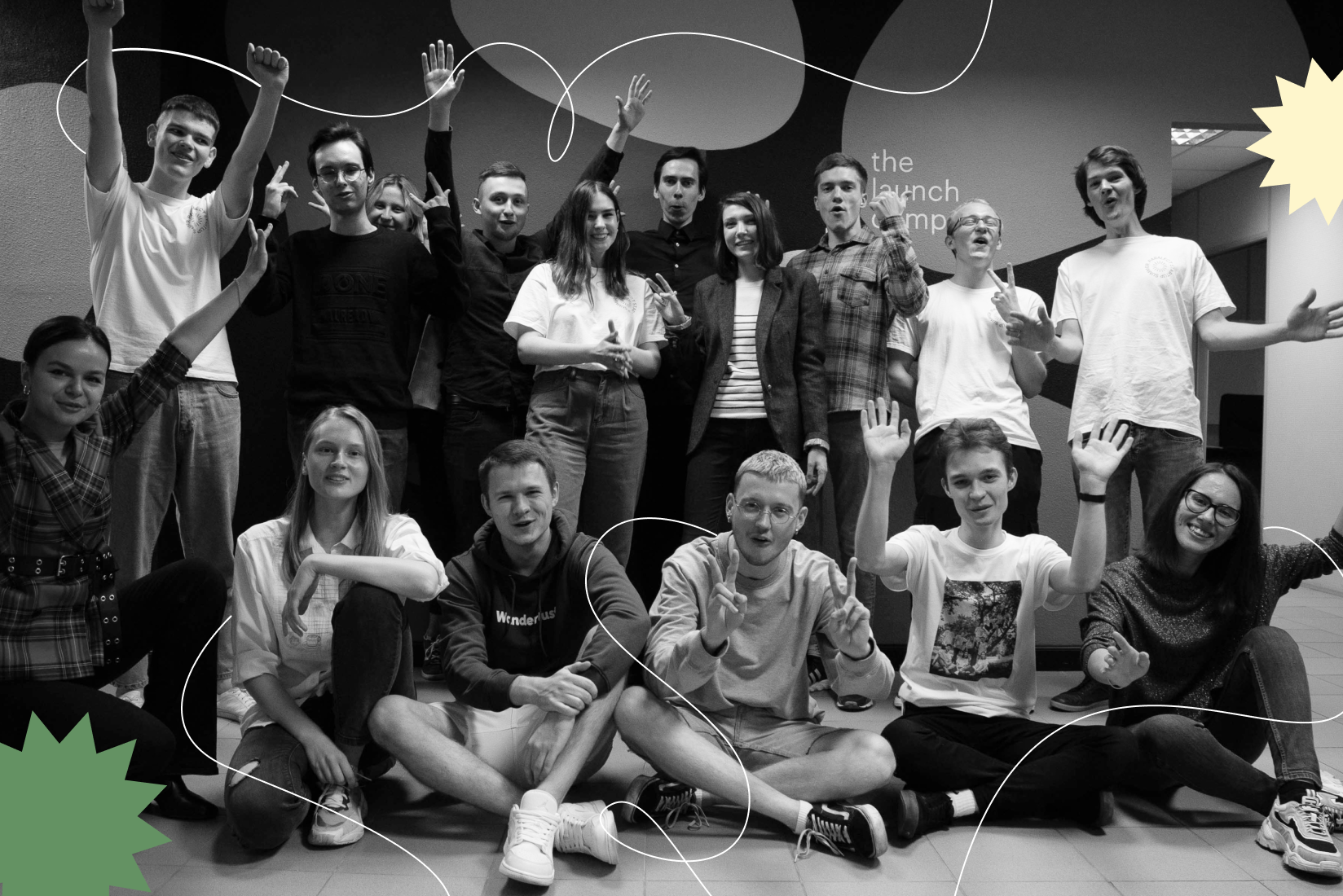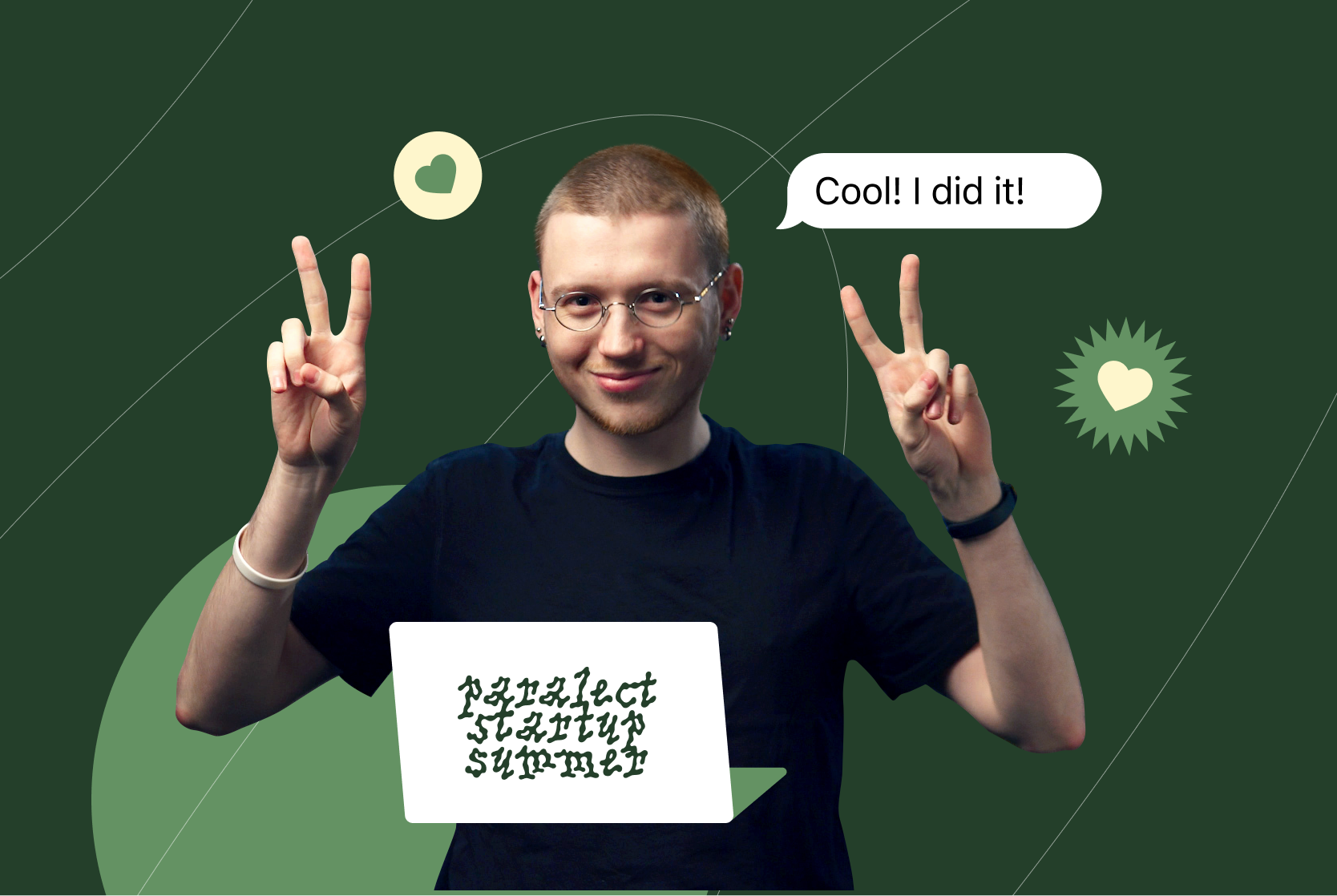How to up-skill without job-hopping: our Tech Lead’s experience
In 2016 I came here as a student in the very first batch of Startup Summer. I was 18 years old. Within 5 years I grew from a Junior developer to Tech Lead & Web3 Explorer.

My case proves that it’s possible to progress without changing jobs regularly. What helps me to enrich my expertise and not stand still?
Let’s find out about:
- Getting into Startup Summer
- Insights from the dev bootcamp
- Starting my first real job
- Continuous learning mindset
- From developer to teacher to mentor
- Sharing a vision of progress
Getting into Startup Summer
How to apply 5 minutes before the deadline and succeed!
I was a second-year student at the Faculty of Applied Mathematics and Informatics at BSU when my classmate sent me a link to the course for developers.
There was a month before the deadline. I thought: “Who takes a test for a month?” A few days before the deadline my friend asked again if I had applied for this free course.
He reminded me just in time. I finished my application at 9.55 a.m — 10 a.m. was the deadline. I also attached a cringey self-presentation video. I hope it hasn’t survived till now 😂
Soon I was invited to an interview. If I’m being honest, I didn’t have much knowledge in programming at that moment. I knew only JavaScript and Ruby. Today there are stricter requirements for candidates for tech courses. In 2016, it was enough to possess some page-making skills.
At that time I was reading a book about C#. But at the interview it was necessary to answer some questions connected with JS. Mainly I answered like this: “I’m not sure there’s such a syntax in JavaScript, but in C# it’s possible to do it like this…”
And I was extremely happy when I was told there was something similar in JavaScript as well. Finally, I passed the selection and joined the first cohort of Startup Summer students.
Insights I got while studying
1. If you want to succeed, be ready to invest time in education
According to the program, we had to study for 8 hours. But in reality, I spent approximately 10-11 hours studying per day. Of course, no one forced us to study so hard.
But I wanted to cope with the mess in my head and understand the material clearly. So I watched videos, read a lot, and tried to code a bit.
If I count how many hours I spent on my studies in two months, it will be 440. And now let’s compare two imaginary people: the first one coded (or skated) just for 10 hours, the second one added 440 hours to this 10.
Can you see the difference? It’s obvious that any person will code or skate in a completely different way after 450 hours of practice. So yeah, the first one is me before Startup Summer. The second one is also me, but version 2.0.”
2. Stay patient and curious if you want to upgrade yourself
It’s important to realize that the path to a new professional level isn’t very easy or all fun. You’ve gotta be ready to do a lot of digging before coming up with some results.
We had very informative lectures at the course. Sometimes they were too informative and complicated. I took part in the very first batch of Startup Summer, so our lecturers didn’t quite know the real level of our background.
They wanted to give us as much information as possible. I remember that some of the current employees came to our classes and could hardly understand what was being talked about.
Today the program looks much more appropriate, well-considered, and balanced. And the students are more skilled than our generation was. Anyway, it was interesting to be among the pioneers.”
3. The internet isn't magic — just dive deeper and explore it
When I saw a good website before the course, I thought: “Looks great, but I can’t imagine how it works — it seems like magic."
In two months of studies, I could not only make a page of this site but also write an app without any help. Such a task sounded unreal for me before the training course.
Why it’s a privilege to start a career early
In two months the course was over. I got a job offer for a developer position. But being frank, I was excited till the end of the course. I felt that I had presented myself nicely.
It was the very first batch, so nobody knew how many students could stay at the company. I was lucky enough to get my first job.
It’s cool to start a career at an early age. It's especially fantastic to get a chance to make a living that you like. Just imagine: you don’t even have to be 20 years old, but an international company says to you: “We want to cooperate with you.” What great wording!
Here are some of my arguments for getting to work at a ‘young’ age:
1. Financial autonomy is a powerful thing
It was the first paid job in my career. There were just several of my group mates at that moment — 5 out of 40 — who had already been working somewhere.
It’s a wonderful feeling when you start to get your own salary and don't need to ask a mother for some pocket money for a pizza. In two months after the course I left my parent's house and rented a sweet four bedroom flat with my colleagues.
2. Work helps you become more efficient and well-organized
The best way to get some practical skills and appropriate knowledge is to start working. The real product development process can differ from the theory you’ve heard at the uni (sometimes it differs a lot).
So a job helps you to manage your time effectively and keep priorities in the right order.
3. Parties don’t end when you start working
Some people think that starting a career when you’re a student is a bad idea. Yeah, you’ll probably spend less time at some uni parties.
But no worries! Work is a great place to make new contacts and find new friends. And there are so many cool corporate parties and team events so I’m never bored.
First projects and a continuous learning mindset
Paralect’s project Maqpie was the first in my career. There I spent two years as a developer. Then I switched to the Chatpath project where I stayed for the next two years.
Later I took up a new role — to be a tech lead at Jobversation and Jipay. It was an interesting experience because I led a team of Startup Summer graduates there. We had to develop an MVP in three months. And we managed to do it really well.
What helped me to upgrade my skills and grow from junior developer to tech lead?
I have two answers other junior devs can learn from:
1. Don’t be afraid of difficult or new challenges
When I got a new task at the beginning of my career I often got anxious and wanted to run away. It’s a common reaction for many of us, I think. People mainly want to walk a path of least resistance.
It’s much easier to deal with well-known technologies and tasks.
But it’s a trap. If you stay in your comfort zone, you don’t get ahead. So the best advice I can give to anyone is to overcome the fear and try to find answers to those scary questions.”
My first task as a dev was setting up Сontinuous Integration with TeamCity. When I heard the task for the first time it sounded like a set of random words. I spent three weeks trying to figure out how it works.
Finally, when it was completed, I felt super happy with my new experience and skills.
The more complicated tasks you cope with, the better for your professional self-confidence. This empowers you for similar situations in future. Today I realize it’s possible to do almost anything — it’s just a question of time and desire.
2. Dive deep into new projects with enthusiasm
Changing a project as a developer means almost the same as changing a job. You’re used to working with a particular app’s architecture, syntax, technologies, and libraries. And suddenly you switch to another project with its own world of rules and approaches.
On the one hand, it sounds a bit scary. On the other hand, it’s a perfect moment for new studies, comparative experience, and practice.
New projects enrich you with new knowledge. I have an illustrative example. I was working on a project with a complex app that was written 8 years ago. The code was written according to old tech, so it was almost impossible to maintain it.
So we embedded new tech inside. This slowed down the page performance — load times were up to 8-10 seconds.
I thought it might be possible to optimize the process. So I decided to study Webpack for this aim. All in all, I managed to reduce the download time to 3-4 seconds. This doubled or even tripled the productivity — an impressive achievement.
How I found myself as a teacher and mentor
In 2020 I was invited as a lecturer for Startup Summer. There I told students about my experience with Webpack. It was my return to the courses but in a new role with another set of skills.

In spring 2021 I became an organizer and mentor of a new batch of Startup Summer. This time together with my colleague we developed a program, prepared a test task for candidates, contacted lecturers, and took part in the workflow.
As a mentor I was involved in all the processes: from organizing classes to developing the MVP and preparing the team for a demo day.
It’s interesting to reflect on my growth from student to mentor.
Mentorship is a super useful tool for developing soft skills. Any mentor has to communicate and cooperate with students a lot. You have to find a suitable approach for every mentee. ”
In the beginning students are often afraid of asking questions. They think they can get kicked off the course if they ask for help too frequently.
So you’ve got to explain that mentors are here exactly for assisting and teaching. We even joke: “We’ll kick you out of the course if you don’t ask any questions, not the other way around.”
It’s crucial to explain that studying is an absolutely normal process. Mistakes help us to become better. When I reviewed a students’ code, I left 20-30 comments and notes on what to improve and rework. Of course,
It would be much faster to correct everything by myself. It’s the shortest way but not the most effective. My goal as a mentor is to explain and teach, empower with the instruments — not to do the job for someone.
If I’m being sincere, mentorship is quite a tiring process. I always care about the atmosphere and other people’s comfort. It requires a ton of energy. Anyway, I really enjoy it but need to have a break and rest a bit later.
How to progress without changing jobs regularly
Paralect is the only company in my career at this moment. Within 5 years I grew from a junior developer to Tech Lead & Web3 Explorer. I’m sure it’s possible to keep growing as a professional without switching jobs.

Of course, over the years I got job offers from other companies. When I was 21 I intended to take the offer. But I stayed here. And I’m totally happy with this decision.
I feel motivated and inspired by the company’s vision. When our managers share their goals I just want to add: “Hey, guys, I want to go with you”.
I’m sure that self-development isn’t about changing jobs on a regular basis.
For me, it’s about working with the tasks and people that inspire you and make you feel interested. I do my job with great pleasure and see my impact in a common result. It’s fantastic.”





